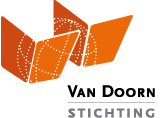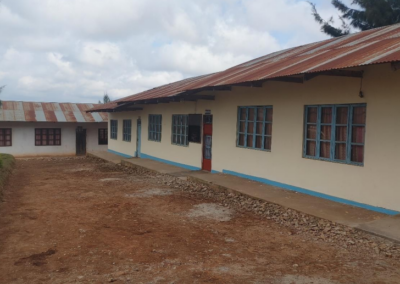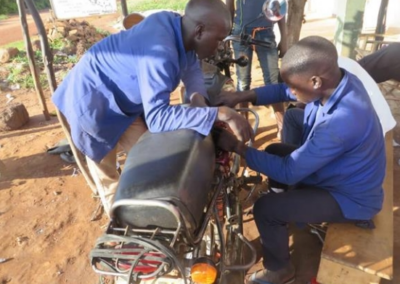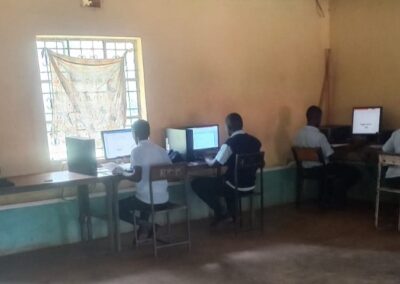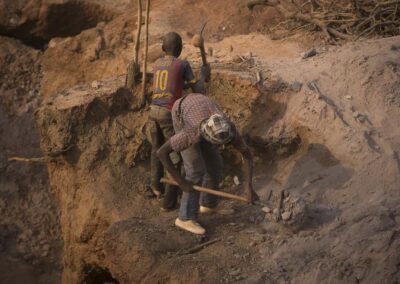Groupe d’Animation et Action au Sahel is a non-governmental organization that receives contracts from international organizations for agricultural development projects. During the implementation of these projects, it identifies, together with the population, the problems that the population faces, not only in agriculture but also in the fields of education and health care.
In these cases, Groupe Animation et Action au Sahel looks for sponsors for components that are not financed by agricultural development projects but are often more important and urgent for the population, such as vocational training for young people in conflict areas who are forced into illegal mining. €5,000 is required for the vocational training and for providing starter toolkits after completing the training.
Amount required: € 5,000
Amount collected: € 5,000
Sponsors: Stichting Overal Nijmegen and Van Doorn Foundation
Project information
The situation
Due to the escalation of conflicts, Mali is facing an unprecedented emergency, which is only getting worse. Conflict, economic malaise, and Covid-19 have left more than 3 million children in need of humanitarian assistance and there has been an increase in children being trafficked or sold, raped, married off, forced into sexual or domestic servitude, or forced to fight for armed groups. In conflict-affected areas, schools have been closed and more and more children are drawn into informal gold mining, in areas largely controlled by armed groups. It is estimated that as many as six thousand children, mainly boys, work in the mining industry. They are exposed to the worst forms of child labour, economic exploitation, and physical, sexual and psychological abuse.
The importance of the project
UNICEF reports education in war-torn Mali is in a state of crisis and in urgent need of international support to repair the damaged education system and get children back to school. International donors respond quickly to emergencies with money for food, water, health care and other basic needs. But they tend to give little for education, which is low on their list of priorities. At the start the 2022-2023 schoolyear, 1500 schools are still closed in central and northern Mali because of security concerns, preventing one-quarter of a million children from getting an education. This is on top of the one million children who regularly do not attend school because of poverty, chronic lack of infrastructure and teachers. Frustrated (unemployed) youth are recruited by terrorist groups, not only to fight but also to work in clandestine gold mines, a source of income for Islamic militants.
The implementing organisation
GAAS Mali was established in 2008, its objectives are the empowerment of communities and to provide them access to basic social services. Most of its experience is in empowerment in agricultural activities (including irrigation) and in agro-businesses. In past eight years it also provided empowerment training for women (nine informal training programs to in total 400 trainees duration 1-3 months). GAAS-Mali has four offices with 84 staff members. GAAS-Mali delivers training either in the open air, in classrooms from schools in the villages and collaborated with the Wassa Institute for vocational training.
The envisaged project results
The project provides training for 20 young people in vocational knowledge and skills for professions in demand in the region. The most sought-after professionals are tilers, plumbers, solar energy technicians, and in agro-business and food production techniques. The training courses for tilers, plumbers, and solar energy technicians last three months and are organized by the Wassa Institute for Vocational Training. The training courses for agribusiness and food production techniques also last three months and are organized by the Groupe d’Animation et Action au Sahel together with the government’s Food Processing Department.
The students are trained to become craft masters and will in turn train others. Each master takes on three apprentices, who will learn the trade in practice over a period of six months. The specialists receive starter toolkits for this purpose. Training 20 young people (as craft masters) will ultimately result in 80 young people having learned a trade and being able to start their own business.
Chance of sustainability
At the end of the vocational training, the students (craft masters) are equipped with the necessary tools and employed as private service providers in the region. They will be paid for their services and will be able to purchase more tools. Each craft master will train three apprentices in their field. This internship will give at least another 60 young people the opportunity to receive on-the-job training and become qualified craftsmen / women. They can organize themselves in cooperatives of service providers to better position themselves in this market and strengthen their economic capabilities.
The required funds
The project lasts 12 months: 3 months of preparation, 3 months of training of craft masters and 6 months of training of apprentices.
- The training for 10 young people at the Wassa Institute to become craft master in tiling, plumbing and solar energy costs € 1,400.
- The training for 10 young people by the Groupe d’Animation et Action au Sahel together with the Food Processing Department costs € 930.
- The purchase of starter toolkits for the craft master in tiling, plumbing and solar energy costs € 1,550.
- The purchase of starter toolkits for the craft masters in agro-business and food production techniques costs € 1,120.
- The guidance of the craft masters during the on-the-job training of others costs € 800.
The municipality and The Groupe d’Animation et Action au Sahel will provide the guidance (equivalent to €800) and the Van Doorn Foundation is looking for sponsors for the remaining €5,000!
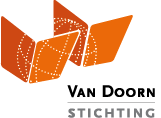
Dear visitor,
We are grateful that you are willing to support us with a donation!
Please fill in the fields below and push the button PAY to transfer the amount by iDeal.
